Introduction
You know, when it comes to Google Ads, there’s one concept that seems to be on everybody’s lips these days: Google Ads Optimization Score. It’s become this kind of mythical unicorn that everyone with regular Google Ads accounts wants to chase, just like how some aim for a high Quality Score. But hold your horses! Before you start adjusting campaign settings in your quest for the elusive 100%, let’s get something straight.
You see, Google’s Optimization Score is more than just a tool. It’s a metric that Google’s machine learning came up with, based on a wide array of factors, from ad relevance to bid strategy. Sure, it can give you some insights about your Google Ads performance and how your ads perform, especially in comparison to new features like video action campaigns, but folks, it’s not the be-all and end-all of your Google Ads campaign strategy. It’s not some magical crystal ball that can see into the future of your ad campaigns, and, truth be told, it won’t turn your Google Ads account into a conversion machine overnight just because you’ve adjusted certain keyword suggestions or tried optimized ad rotation.
So, let’s cut through the noise and dive into what this score is all about. But, remember, we’re not here to idolize this optimization score. Far from it. We’re going to demystify it, understand its role and limitations within the context of Google Ads UI and Google Ads Editor, and, most importantly, learn how to take its readings with a pinch of salt when looking at the recommendations tab or when dealing with smart bidding.

A low optimization score does not mean a google ads account is being mismanaged, and a high optimization score doesn’t necessarily indicate that the account’s past performance data is perfect. It’s also crucial to acknowledge that not every google ads recommendation Google makes in the recommendations tab is a must-follow rule. Just like in life, and especially when assessing google ads performance or ad rank, you’ve got to take some advice, leave some, and craft your own unique campaign strategy.
In the next sections, we’ll dive deeper into what goes into the google ads optimization score, how Google’s algorithms and machine learning methods calculate it, and what you should really make of it, especially when considering active campaigns or adjusting campaign settings. So, buckle up, keep an open mind about Google’s recommendations, and let’s get started.
What is Google Ads Optimization Score, Really?
Alright, let’s get down to brass tacks. So, what exactly is this Google Ads Optimization Score that’s been creating such a hullabaloo? In simple terms, it’s a score that Google gives you, a kind of performance grade that ranges from 0% to 100%. Google is telling you, “Hey, this is how well we think you’re doing with your ad campaigns based on our algorithms and standards.”
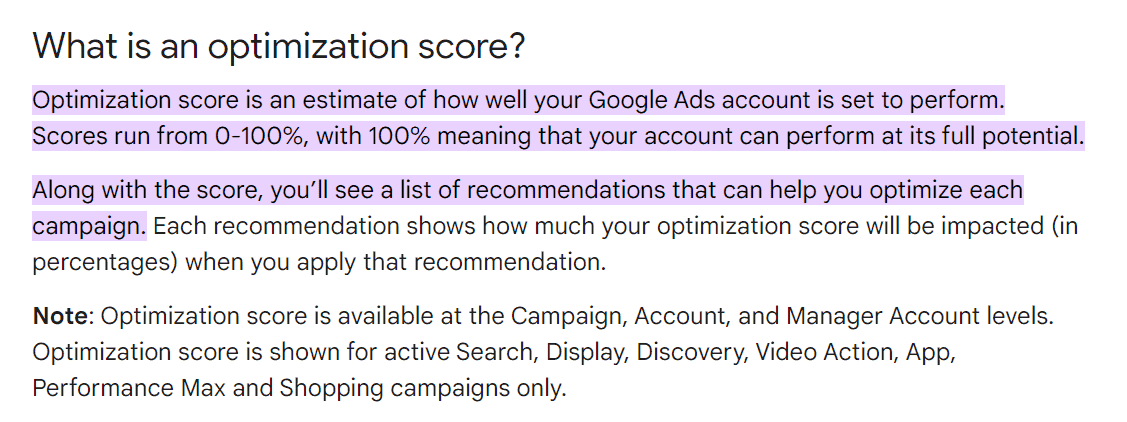
But here’s where it gets interesting. Google doesn’t just toss you a number and leaves you scratching your head about what to do next. No, siree! They also throw in a bunch of recommendations on how you could, in theory, optimize your ad campaigns. Google also predicts how these recommendations could potentially affect your score. Sounds pretty neat, right?
You’ll find your Optimization Score in your Google Ads account, and it can be at these levels: Campaign, Account, or Manager. But bear in mind that this score is currently only available for these types of campaigns: Search, Display, Video auction, and Shopping.
Now, here’s where I want you to pay extra attention. While all this seems handy, remember it’s not a roadmap to success. It’s more like a compass that gives you a general direction. But you’ve still got to navigate the terrain yourself, and believe me, it’s not always as straightforward as it seems.
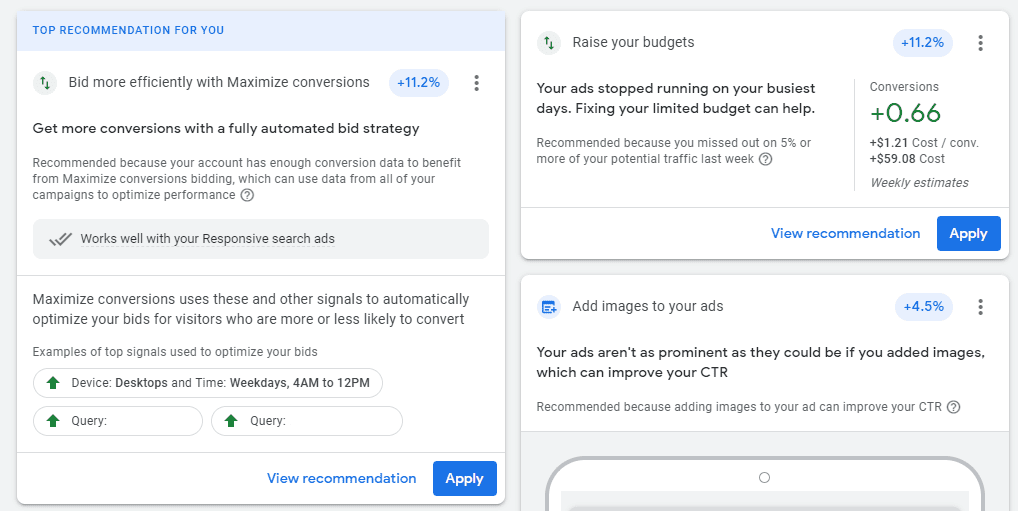
Your score will vary based on several factors like your current results, your settings, how well your account matches Google’s recommendations, your recent recommendations history, and your status as an advertiser. Google’s machine learning tools do the heavy lifting here, sifting through your past performance data, assessing your account setup, and coming up with new ways to optimize your ads.
But folks, don’t let Google dazzle you. It’s not wizardry. It’s an algorithm at work, doing its thing. So, while the recommendations could point out some potential areas for improvement, they might not always align with your specific business goals or ad strategies. It’s crucial to take these suggestions under advisement, but remember, you don’t have to implement every single one of them.
So, yes, the Google Ads Optimization Score can be useful, but it’s not the ultimate truth. It’s one tool in your toolbox, not the toolbox itself. Keep that in mind as we move forward.
Why Google Ads Optimization Score Isn’t the Holy Grail
Okay, folks, let’s get one thing straight. Despite what this shiny feature might lead you to believe, a perfect Google Ads Optimization Score of 100% doesn’t necessarily mean you’ve hit the jackpot. And conversely, a low score doesn’t automatically signify doom and gloom. It’s not a definitive measure of success or failure.
Why is that, you ask? Let’s dive a little deeper. If your score is at 100%, it simply means you’ve followed Google’s recommendations to the letter. It’s a pat on the back from Google for adhering to their guidelines. However, what’s good for Google isn’t always good for your specific account or business needs.
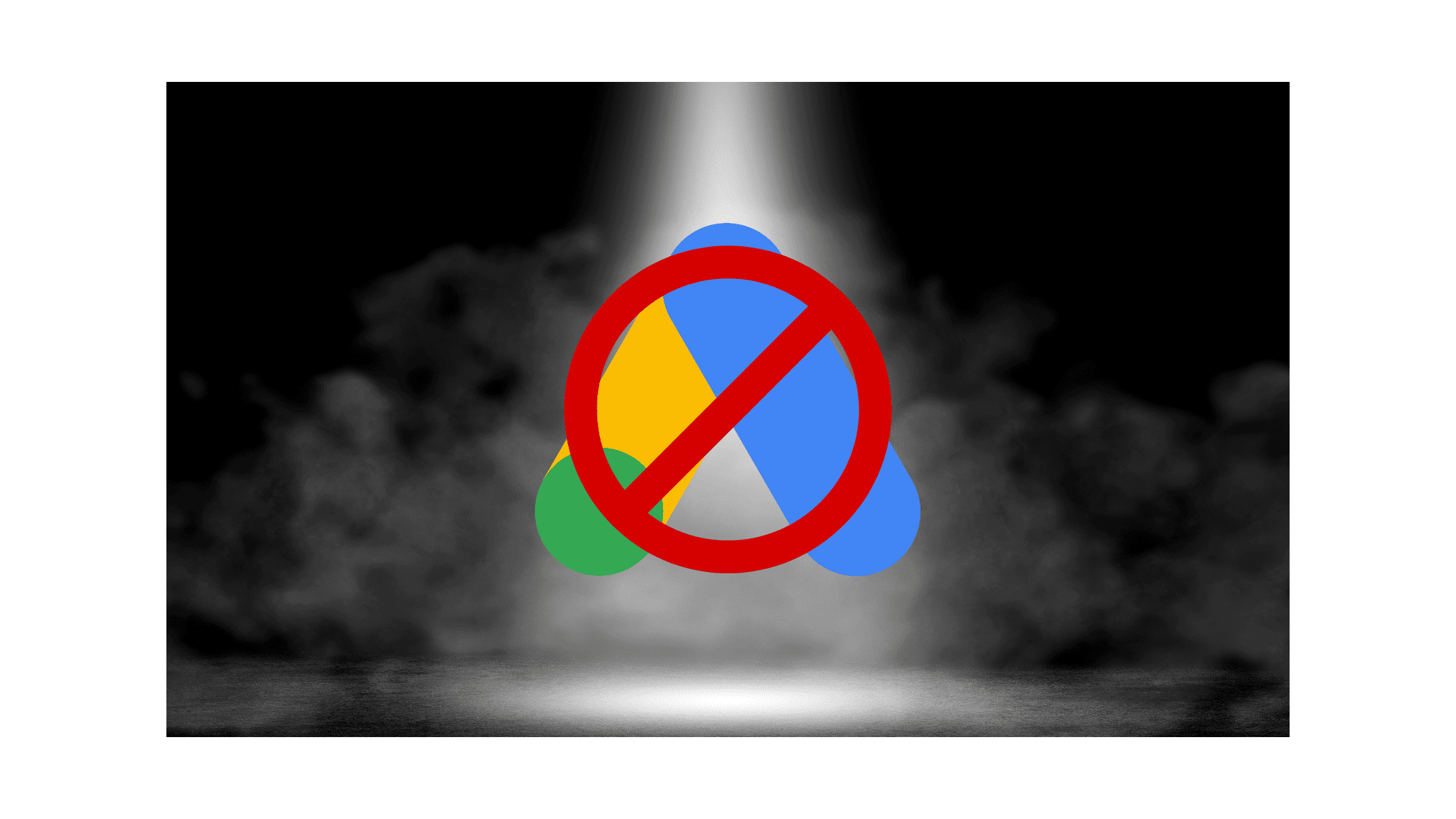
Every ad campaign is unique, just like our fingerprints. Each comes with its own set of goals, challenges, and potential solutions. The Optimization Score and Google’s recommendations are generated through automated processes and algorithms. And while they can provide useful insights, they don’t have the full context of your business.
So while a higher score may make you feel warm and fuzzy, it might not translate to improved ad performance or better business results. Remember, it’s not about chasing a perfect score, but about making sure your ads are delivering the results YOU want.

Dissecting Google’s Recommendations
Now, let’s talk about those Google recommendations that come with your Optimization Score. They’re Google’s suggestions on how you could potentially improve your ad campaigns, which in turn, should theoretically boost your score.
But let’s pause for a moment and consider this: should you implement every recommendation that Google throws your way? In a word, no.

Here’s the deal. Navigating google’s recommendations can be similar to a buffet. With a plethora to choose from, like those found in the recommendations tab, it’s essential not to gorge on every option. Always prioritize based on your business goals, campaign strategy, and specific requirements. For instance, some google ads recommendations could seamlessly fit within your google ads account and provide immediate, favorable impacts on your google ads campaigns. Prioritize these. Others, especially those allowing you to adjust campaign settings or implement responsive search ads, can give you a better grip on your ad campaigns and are definitely worth your attention.
However, amidst these recommendations, you might stumble upon suggestions that aren’t in sync with your account structure or the objectives of specific ad groups. In such scenarios, don’t hesitate to sidestep them. Overlooking these can prevent any undue drag on your google ads optimization score. Yet, be vigilant, as Google, with its intricate google’s algorithms and google’s machine learning capabilities, might reintroduce them if the core issue remains unresolved.
Broadly, while the optimization score recommendations from Google offer insights and can hint at new features or techniques to enhance overall campaign performance, they aren’t unalterable directives. As the overseer of your google ads accounts, you possess the acumen about your enterprise. Harness google adwords and other tools, but always ensure your ad copy, target cpa, and strategies are tailored to your unique vision, rather than being solely dictated by an optimization score.
Recommendations to Approach With Caution
Now that we’ve established that Google’s recommendations should be taken with a pinch of salt when considering your google ads account, let’s discuss a few specific ones that often appear in the recommendations tab and may need to be approached with a bit more caution.
- Redundant Keywords: Reflecting on your google ads campaigns and the optimization score, Google might recommend removing reducent keywords. While that might sound sensible, especially from a google ads optimization viewpoint, remember that even slight variations in keywords can target different search intents. So, delve into the google’s optimization score guidance, and consider the potential impact before eliminating these keywords.
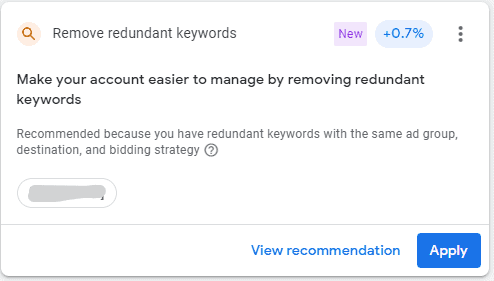
- Enable Search Partners: A factor that might affect your overall campaign performance. However, your ads might not perform equally well on search partner sites as they do on Google. If you’re not considering search partners performance separately, this might not be a recommendation to accept hastily.
- Keyword Suggestions: Using google’s machine learning, Google often suggests adding new keywords. But remember, not all keywords align with the business goals of your google ads campaigns. Evaluate the suggested keywords critically.
- Ad Suggestions: When considering ad relevance, Google might hint at creating responsive search ads or other dynamic search ads based on your existing content. However, Google’s automated ad suggestions might not always be in line with your brand voice.
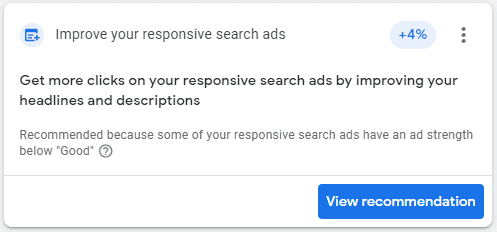
- Smart Bidding Strategies: Google’s black box might recommend smart bidding techniques. While these might save time, they might not always deliver the best optimization score or results you aim for in your google ads account.
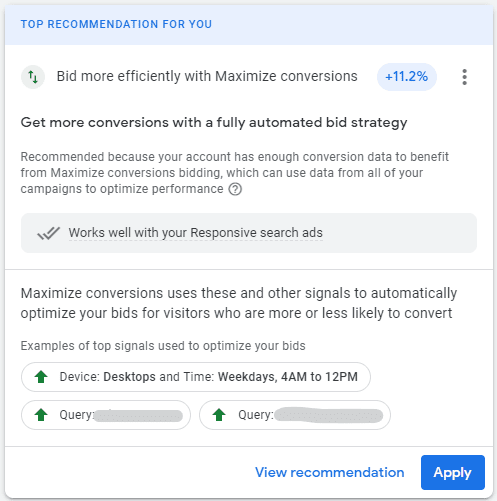
Look, when you’re adjusting campaign settings or evaluating google ads tactics, remember this: these recommendations, whether they’re about ad groups or ad rank, aren’t the be-all and end-all. You’re the ruler of your ad kingdom, aiming for the best google ads performance. It’s essential to consider each piece of advice within the context of your campaign strategy and actual performance data. Google’s tools can be valuable, but the final decision should align with your business’s objectives.
Making the Most Out of Google Ads Optimization Score

So, diving into the world of google ads, we’ve unraveled what the Google Ads Optimization Score is, how it’s calculated, and the significance of the recommendations tab linked with it. But a burning question looms large: in your google ads account, how can you leverage this tool effectively without being obsessively driven to attain that elusive 100% score?
- Use the Score as a Guideline: Just as we’ve emphasized before, the optimization score isn’t the epitome of google ads performance. Rather, envision it as a GPS guiding your google ads campaigns. While it can spotlight optimization techniques or suggest innovative campaign strategies, the ball is in your court to decide which turn to take.
- Consider Your Business Goals: Always ensure that your google ads optimization initiatives are in sync with your overarching business objectives. When you’re going through google’s recommendations and evaluating your baseline optimization score, reflect on this. Does a suggested alteration resonate with your aims? Does it hold the potential to augment your desired results? If it’s a misfit, sideline it, irrespective of how much it might elevate your score.
- Test, Test, Test: The dynamic realm of digital marketing thrives on experimentation. This ethos extends to the recommendations stemming from your Google Ads Optimization Score. Embrace the spirit of trial, but simultaneously, be diligent in gauging the ramifications of alterations to grasp their efficacy.
- Keep an Eye on Performance Metrics: The core aspiration of your google ads campaigns isn’t merely to achieve a good optimization score. It could translate to amplifying traffic, multiplying leads, bolstering sales, or magnifying brand visibility. These metrics are your North Star, ensuring they overshadow the optimization score in your decision-making calculus.
In summation, while the Google Ads Optimization Score can augment your digital marketing arsenal, its application should be judicious and discerning. Keep your business’s pulse at the heart of your actions, maintain a healthy skepticism towards Google’s recommendations, and relentlessly pursue knowledge and adaptability.
In the vast landscape of Google Ads, remember, you helm the ship, and the Optimization Score is merely a navigational instrument in your expansive toolkit. Rather than being governed by it, harness it to inform and enrich your strategies, propelling your digital marketing ventures to unparalleled zeniths.
Making Sense of It All
Alright, folks. We’ve covered substantial terrain on the Google Ads platform in this piece. But when the dust settles, what’s the essence? The Google Ads Optimization Score can be a robust tool in your google ads account, yet it’s not the definitive metric. It doesn’t solely determine the overall campaign performance or signify if you’re acing your business goals.
- Ignore the Noise: In a world driven by google’s algorithms and appealing metrics, it might seem vital to achieve that 100% Optimization Score. However, it’s not the zenith. Visualize the Optimization Score as a compass for your google ads campaigns. It illuminates potential campaign strategies, but there’s no obligation to heed all google ads recommendations. Trust your instincts, lean on your expertise, and always prioritize your business intentions foremost.
- Understand the Intent: Google’s recommendations, seen on the recommendations tab, serve various purposes. While they aim to improve campaign performance, they often nudge advertisers towards embracing new features or video action campaigns that Google launches. Deciphering the intent behind each suggestion and making informed decisions is pivotal.
- Test and Learn: Digital marketing, characterized by its transient nature, is ever-evolving. Tactics that skyrocketed ad campaigns yesterday might plateau today. Harness this industry’s dynamism and foster a ‘test and learn’ ethos. Implement changes, scrutinize google ads performance, adapt, and refine. This iterative approach is paramount for adept Google Ads management.
- Quality Over Quantity: A crucial reminder – it’s not the volume of modifications but their essence that matters. When orchestrating your ad groups or mulling over keyword suggestions, remember: in your ad realm, quality invariably supersedes quantity. Whether it’s deciding on ad copy or contemplating smart bidding, prioritize value when tailoring your google ads account.
To encapsulate, the Google Ads Optimization Score is just a tool – its effectiveness hinges on the user’s expertise. Engage with it discerningly, blend critical analysis with a relentless pursuit of your business objectives, and you’re on a trajectory to excel in Google Ads optimization.
And as a final note, while chasing the allure of a stellar score, never let it overshadow the grander scheme. That number is just a beacon; your strategic moves define the success.



